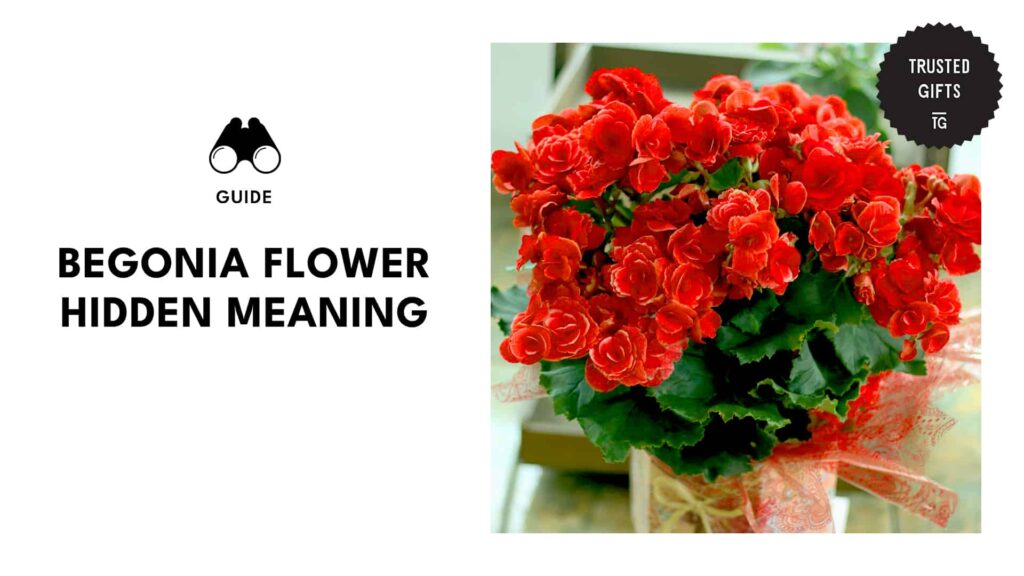Begonia flowers are nature’s exquisite gift that burst with vibrant colors and rich symbolism.
Whether you’re looking to send a heartfelt message through a bouquet or simply add a touch of elegance to your home and garden, these flowers have so much to offer!
In this article, we will discuss the begonia flower’s meanings, origins, and uses.
How did the begonia flower get its name?


The begonia flower was named after the French naturalist and statesman, Michel Begon.
He was a passionate plant collector who formed a friendship with Charles Plumier who was a renowned French botanist credited with the discovery of begonia flowers during his stay in the Antilles.
Michel Begon had endorsed Plumier as the head plant collector in the Caribbean to King Louis XIV. This opened doors for Plumier and enabled him to go on expeditions across the globe and discover various plant species.
When he discovered begonia flowers in 1690, he decided to name them in honor of Michel Begon as a gesture of appreciation and acknowledgment for Begon’s role in Plumier’s career in botany.
What are the botanical origins of the begonia flower?


Begonia is a genus of perennial flowering plants that belong to the Begoniaceae family. This genus has over 2,000 plant species, making it one of the largest genera among flowering plants.
They are native to the subtropical and tropical regions across Central and South America, Africa, and Asia.
Begonias are monoecious, which means that male and female flowers exist on the same plant. Male flowers are characterized by numerous stamens, while female flowers feature a large inferior ovary and two to four branched or twisted stigmas.
Do begonia flowers require a lot of maintenance?
Begonias are relatively low-maintenance plants, but be sure to provide them with basic care and proper humidity.
Deadheading is also unnecessary since they are known to “self-clean,” where the flowers naturally fall off as they start to fade and new ones bloom.
Do begonia flowers need shade or sun?
Begonia flowers tend to thrive when they are exposed to dappled sunlight or partial shade. Too much sun can burn the leaves and dry them out.
When do begonia flowers bloom?
Begonia flowers typically bloom from early summer until fall. This blooming might even last a full year, depending on the variety.
What kind of soil do begonia flowers prefer?
Begonia flowers thrive in well-draining, slightly acidic soil that’s rich in organic matter with a pH range of 5.7 to 6.2
When potting them, consider using a blend of approximately four parts well-decayed leaf mold, one part garden soil, and one part coarse sand. If you can’t find well-decayed leaf mold, any good potting mix will also work well.
When is the best time to plant begonia flower seeds?
Begonia seeds are small and must be first sown indoors in late spring.
What do begonia flowers mean?


Begonia flowers symbolize harmony, uniqueness, gratitude, or caution. They also represent love, affection, desire, longing, pleasure, and gladness.
What do the colors of begonia flowers mean?
White


White begonia flowers symbolize purity and innocence.
Recommended use: These flowers are perfect for spiritual ceremonies like weddings and christenings. They can also be used on other occasions like baby showers.
Red


Similar to other red flowers, a red begonia symbolizes love, passion, romance, and energy.
This isn’t a flower you’d typically give to someone you just met—unless, of course, you’re deeply attracted to them!
Recommended use: A red begonia flower is a thoughtful gift to a partner or a romantic interest. It signifies enduring love, desire, and devotion.
Pink


A pink begonia flower symbolizes love and romance but with a milder intensity compared to the red begonia.
Recommended use: Pink begonias are a fitting choice when you want to express affection or interest in someone.
These flowers are ideal gifts on occasions like Valentine’s Day and can be an excellent addition to a bouquet for a first or second date.
Yellow


Yellow begonia flowers symbolize happiness, joy, and wealth. They also represent hope, friendship, kindness, and new beginnings.
Recommended use: Yellow begonia flowers are ideal gifts for a loved one to brighten up their day. They can also bring a sense of optimism when placed in your home.
Purple
Purple begonia flowers symbolize nobility, respect, and loyalty. They are also associated with creativity, wisdom, and spirituality.
Recommended use: These flowers are excellent gifts to someone you truly respect and consider a very important person in your life.
What did begonia flowers symbolize in various historical periods?


In the Victorian era, begonia flowers were frequently given as gifts to symbolize deep and romantic love. They were considered a representation of passion and were commonly used in love spells and potions.
Additionally, begonias were seen as a symbol of fancifulness and were often used in gardens and floral displays.
What are the cultural associations of begonia flowers?


What are the uses of begonia flowers?


Begonias are not just beautiful flowers that can be used in bouquets and floral arrangements for their beauty and symbolism. They also have practical uses in cooking, medicine, gardening, and landscaping.
How can begonia flowers be used in cooking?


Here’s how you can use begonia’s unique flavor in your cooking:
- Salads: Begonia flowers make an exquisite addition to salads, not only for their visual appeal but also for their subtly tangy flavor.
They give salads a hint of brightness and freshness that transforms a simple salad into a vibrant and flavorful dish. You can scatter the petals or whole flowers on your salad.
- Desserts: Begonia flowers can be used to garnish cakes, cupcakes, and pastries to infuse them with a mild tanginess that balances the sweetness of the treats.
- Beverages: Begonia flowers can also be used in creating beverages. You can use them to garnish cocktails, mocktails, and herbal teas.
The begonia’s tangy notes can enhance the flavor profile of your drinks while adding an elegant and visually appealing design to them.
It’s important to note that some varieties of begonia flowers contain oxalic acid, so they should be avoided by people suffering from gout, rheumatism, or kidney stones.
Can begonia flowers be used for medicinal purposes?


Yes, begonia flowers can be used in treating various illnesses. Here are some of the illnesses they help treat:
- Bronchitis: Bronchitis is the inflammation of the bronchial tubes, also known as bronchi.
This can be relieved through the antimicrobial agents present in begonia rhizomes that can address the accumulation of mucus within the bronchial tubes.
- Digestive Disorders: Begonia has been used in treating severe digestive problems like diarrhea, watery and loose stools, and dysentery, an infection or inflammation of the intestine that can lead to blood in the stool.
- Menstrual Disorders: Begonia flowers have been used in alleviating symptoms associated with premenstrual syndrome and menstrual cramps.
How can begonia flowers be used in gardening and landscaping?


Use begonias in your garden through the following ideas:
- Borders: Begonia flowers can be used to create stunning borders in your garden. Their wide range of colors and varying sizes can make creative combinations to define pathways or garden beds.
Whether you want to achieve a cohesive color scheme or a vibrant mix of hues, these flowers can be tailored to your landscaping vision.
- Containers: Begonia flowers are a fantastic choice for potted plants. You can plant them in containers on your porch, balcony, or anywhere you’d like to add a splash of color.
- Hanging Baskets: Another way to use begonia flowers in your landscaping is by hanging them in baskets. Their cascading growth habit and abundant blooms create an eye-catching display to elevate your outdoor decor.
Whether you prefer a single begonia variety or a mix of complementary colors, hanging baskets can be a charming and unique addition to your garden.




